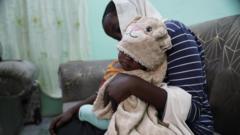A recent UNICEF report reveals the harrowing reality of child sexual violence in Sudan's civil war, where armed men are targeting children as young as one year old. The report underscores the urgent need for international action to protect vulnerable children amid widespread abuse.
Alarming Rise of Child Sexual Violence in Sudan's Civil War

Alarming Rise of Child Sexual Violence in Sudan's Civil War
UNICEF reports that children as young as one are being raped amidst the ongoing violence in Sudan, highlighting a dire humanitarian crisis.
In the ongoing civil war in Sudan, a shocking report from UNICEF reveals that children, including infants as young as one year old, are being subjected to rape and sexual violence. The report sheds light on the severe trauma faced by survivors, many of whom are contemplating suicide due to their experiences. This unprecedented mass sexual violence has become a disturbing tactic of war during the nearly two-year-long conflict in the region.
UNICEF's findings suggest that while 221 cases of child rape have been officially reported since the beginning of 2024, the actual figures are likely far higher, due to societal stigma and fear of retribution preventing victims from coming forward. This marks the first in-depth analysis of the impact of such violence on Sudan's youth. Alarmingly, one-third of the victims identified are boys, who face unique challenges in seeking help.
Among the most distressing accounts, UNICEF reports that 16 of the victims were under five years old, including four infants, highlighting the horrific extent of the crisis. Unconfirmed reports implicate the paramilitary Rapid Support Forces (RSF) in these abuses, as they are accused of systematically employing sexual violence to intimidate civilians and stifle dissent. The RSF has denied these allegations, insisting they are unfounded.
UNICEF's executive director, Catherine Russell, condemned the atrocities, emphasizing that such violence against innocent children is a constituent breach of international law and warrants immediate intervention. The organization warns that millions of children in Sudan remain at grave risk due to the ongoing conflict, which is increasingly marked by sexual violence as an instrument of war.
Testimonies provided in the UNICEF report paint a grim picture of the atrocities. One survivor recounted traumatic experiences of witnessing a young girl being raped repeatedly, returning each time in a state of shock and physical trauma. These incidents often occur in public settings, with armed assailants forcibly taking children away from their families, leaving irreversible scars on victims.
In the aftermath of these tragedies, medical services in Sudan remain critically underfunded, particularly following cuts to US aid which have led to the closure of critical support services for survivors. Local organizations, particularly those run by women, play a crucial role in aiding victims but receive minimal funding from international sources.
The intricate plight of victims grows more desperate as war continues to displace millions, leading to heightened vulnerability among women and children. As three out of four school-age girls are reportedly out of school, the community faces an escalating crisis.
UN humanitarian efforts are strained further by resource shortfalls, and local initiatives providing essential support are in jeopardy. As national and international attention is drawn to these horrendous acts, it is imperative that the global community mobilizes to safeguard children in Sudan and to halt the rampant cycle of violence that threatens their very existence.
UNICEF's findings suggest that while 221 cases of child rape have been officially reported since the beginning of 2024, the actual figures are likely far higher, due to societal stigma and fear of retribution preventing victims from coming forward. This marks the first in-depth analysis of the impact of such violence on Sudan's youth. Alarmingly, one-third of the victims identified are boys, who face unique challenges in seeking help.
Among the most distressing accounts, UNICEF reports that 16 of the victims were under five years old, including four infants, highlighting the horrific extent of the crisis. Unconfirmed reports implicate the paramilitary Rapid Support Forces (RSF) in these abuses, as they are accused of systematically employing sexual violence to intimidate civilians and stifle dissent. The RSF has denied these allegations, insisting they are unfounded.
UNICEF's executive director, Catherine Russell, condemned the atrocities, emphasizing that such violence against innocent children is a constituent breach of international law and warrants immediate intervention. The organization warns that millions of children in Sudan remain at grave risk due to the ongoing conflict, which is increasingly marked by sexual violence as an instrument of war.
Testimonies provided in the UNICEF report paint a grim picture of the atrocities. One survivor recounted traumatic experiences of witnessing a young girl being raped repeatedly, returning each time in a state of shock and physical trauma. These incidents often occur in public settings, with armed assailants forcibly taking children away from their families, leaving irreversible scars on victims.
In the aftermath of these tragedies, medical services in Sudan remain critically underfunded, particularly following cuts to US aid which have led to the closure of critical support services for survivors. Local organizations, particularly those run by women, play a crucial role in aiding victims but receive minimal funding from international sources.
The intricate plight of victims grows more desperate as war continues to displace millions, leading to heightened vulnerability among women and children. As three out of four school-age girls are reportedly out of school, the community faces an escalating crisis.
UN humanitarian efforts are strained further by resource shortfalls, and local initiatives providing essential support are in jeopardy. As national and international attention is drawn to these horrendous acts, it is imperative that the global community mobilizes to safeguard children in Sudan and to halt the rampant cycle of violence that threatens their very existence.




















